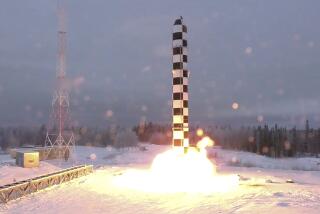Russia Warns U.S. to Uphold U.N. Charter
- Share via
MOSCOW — As it toughened its stance against a proposed resolution that would set a deadline for Iraq to disarm, Russia charged Saturday that unilateral U.S. military action would violate the U.N. Charter.
“We believe that it is not necessary at present to adopt any new resolutions,” Foreign Minister Igor S. Ivanov said in comments released Saturday. “If the United States unilaterally begins military action in relation to Iraq, it would violate the U.N. Charter, and, of course, when the U.N. Charter is violated, the Security Council must gather, discuss the situation and make the corresponding decisions.”
Other Russian officials also sharply criticized Washington’s approach to dealing with Iraqi President Saddam Hussein and his alleged weapons of mass destruction.
“Russia’s attitude on the resolution is extremely negative because it leads to war, the termination of inspections and might trigger unpredictable consequences,” Deputy Foreign Minister Yuri Fedotov said.
The resistance to the Bush administration’s Iraq policy is hardening in part because the key issue is becoming one of how to restrain the United States in its exercise of global power, Russian analysts said.
Alexander Konovalov, president of the Institute for Strategic Assessment, a Moscow think tank, stressed that Hussein “is a bandit, no doubt,” but “by far not the biggest and not the most important.”
“In this world of bandits, there are still no police, no courts and no law,” Konovalov said. “There is only one sheriff -- the USA -- and even this sheriff has been self-proclaimed and not elected. It is a good thing that at least someone wants to be the sheriff. But it is also clear as daylight, if this sheriff is not controlled, if he is allowed to run amok and rule arbitrarily, he will quickly end up becoming another bandit -- only bigger and stronger than all previous ones.”
Russia’s position reflects “the desire not to allow the U.S. to do whatever it wants,” said Ivan Safranchuk, director of the Moscow branch of the Washington-based Center for Defense Information.
But Russia is also looking for safety in numbers in standing up to the United States. The most active opponents of a new U.N. resolution -- France, Russia and Germany -- have coordinated their positions not so much because they believe that they can change U.S. policy but because they want to ensure that none faces America’s wrath alone, Konovalov said.
“The thing that truly scares each of the three is to be left in the Security Council alone, face to face with the U.S.,” he said. “Each of the three fears that the other two partners will betray their cause and side with the U.S. at the last moment.... It is clear that America would find a way to punish the last renegade who refused to subscribe to the U.S. position.”
Self-preservation notwithstanding, the United States is widely seen here as flouting international law in its determination to oust Hussein regardless of the Security Council’s position.
“Even if Russia and other members of the Security Council vote against the resolution, nothing will change and there will be a war all the same,” said Alexander Vladimirov, vice president of Moscow’s independent Collegium of Military Experts. “But when the first strike is dealt on Iraq, people in Europe, in Russia and in Muslim countries will call America an empire of evil. Under the debris of international law ruined by the United States, the entire system of global checks and balances will collapse.”
Vladimirov said that although he believes “it is too late now” to head off a war, “Ivanov’s statement about the violation of the U.N. Charter is nevertheless important for one simple reason: It is the truth.”
Dmitri Rogozin, head of the international affairs committee in the State Duma, Russia’s lower house of parliament, suggested that it is not so much the Iraqi issue but the fate of the United Nations that is being decided.
“If one country can ignore the warnings of other countries, as is happening now, Russia must proceed from the premise that it will have to carry out its policy in new conditions, counting more on itself,” Rogozin told the Itar-Tass news agency.
As for economic interests in Iraq, Vladimirov said President Vladimir V. Putin should not be too concerned, even about the $8-billion debt Moscow is owed by Baghdad. A new Iraqi government would realize that “it is important to be friends with such a huge and powerful neighbor as Russia,” Vladimirov said. “Putin should not even worry about whether Iraq pays its debt back. If it happens, it’s good. If it does not, it is not a tragedy either.”
The United States made a serious mistake, Safranchuk said, “when Washington began to actively intimidate Russia and say that whether or not Russia’s interests in Iraq will be reckoned with depends really on one thing -- the way Russia votes in the Security Council.”
“This was regarded as open and barefaced pressure, which Moscow was offended by,” he said. “It had thought that at least overtly the U.S. would make it look like negotiations between equal partners.”
Alexei V. Kuznetsov of The Times’ Moscow Bureau contributed to this report.
More to Read
Sign up for Essential California
The most important California stories and recommendations in your inbox every morning.
You may occasionally receive promotional content from the Los Angeles Times.













